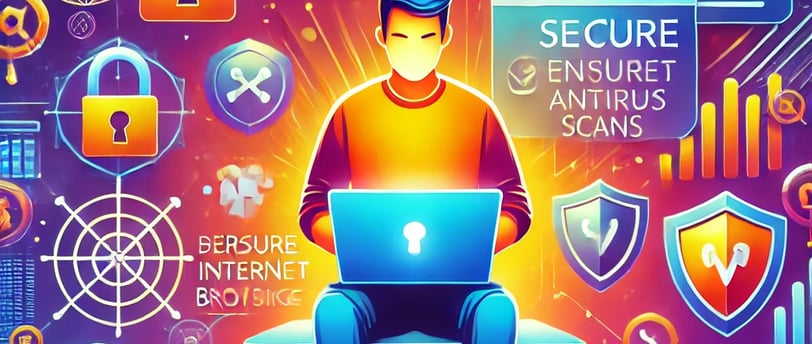Best Practices on the Internet
How to Browse Safely and Protect Your Personal Data


How to Browse Safely and Protect Your Personal Data
The internet has transformed our lives, making access to information, online shopping, communication, and entertainment easier. However, along with these advantages, risks such as fraud, identity theft, and cyberattacks have emerged. Protecting your data and browsing safely is essential to avoid inconveniences and losses.
In this article, we present a comprehensive guide with practical tips and tools to protect your personal data and prevent fraud while navigating the internet.
Why Is Internet Security So Important?
Every day, thousands of users fall victim to online scams. Digital criminals use various strategies to deceive people, from fake websites to phishing emails. Lack of knowledge about best practices on the internet can expose sensitive information, such as:
Banking account passwords;
Credit card details;
Personal information, such as ID numbers and addresses.
Protecting yourself starts with adopting simple habits and using tools that strengthen security.
1. Care When Creating and Managing Passwords
Passwords are the first barrier between you and a criminal. A weak password can be easily discovered, compromising important accounts.
Tips for Creating Strong Passwords:
Use combinations of uppercase and lowercase letters, numbers, and special characters.
Example: F3r#Pr0t3g3r!Avoid personal information, such as birth dates or names.
Create unique passwords for each account. If one is compromised, the others remain protected.
Regularly update your passwords, especially for important accounts like email and banking.
Useful Tools:
Password Managers: Apps like LastPass, 1Password, and Dashlane help create and store secure passwords.
2. Be Cautious When Accessing Public Wi-Fi Networks
Free Wi-Fi in cafes, airports, and shopping centers is convenient but often insecure. These networks can be exploited by hackers to intercept your data.
Best Practices:
Avoid accessing banking accounts or making online purchases on public networks.
Whenever possible, use your mobile data network for sensitive operations.
Ensure you’re connected to the official network of the location, not a fake network created by scammers.
Useful Tools:
VPN (Virtual Private Network): Apps like NordVPN, ExpressVPN, or ProtonVPN encrypt your connection, protecting your data even on public networks.
3. Verify Websites Before Entering Data
Fraudulent websites are one of the most common forms of internet scams. They mimic legitimate pages to trick users and steal information.
How to Identify Trustworthy Websites:
Check for the padlock icon in the address bar: Sites with HTTPS are more secure.
Confirm the website address: Ensure the domain is correct (e.g., www.yourbank.com).
Avoid clicking on links sent via emails or unknown messages.
Useful Tools:
Browser extensions like McAfee WebAdvisor and Avast Online Security alert you to dangerous websites.
4. Protection Against Malicious Emails (Phishing)
Phishing emails pretend to be from trusted companies to deceive you. These scams often ask you to click on links or download malicious files.
How to Identify Suspicious Emails:
Check the sender: An unknown or strange domain (like @bank123fake.com) is a red flag.
Spelling errors or forced language are common in fraudulent emails.
Links that lead to pages different from what is promised.
Best Practices:
Never provide personal information in response to suspicious emails.
If in doubt, contact the company directly through official channels.
5. Managing Personal Data on Social Media
Social media can expose more personal information than you realize. Scammers can use this information to tailor attacks.
Tips to Protect Your Social Media:
Set privacy permissions to share only with trusted friends.
Avoid posting sensitive information, such as addresses, ID numbers, or travel plans.
Enable two-factor authentication whenever possible.
6. Keep Software and Devices Updated
Keeping your operating system, browser, and apps updated is essential to fix security vulnerabilities.
Best Practices:
Enable automatic updates on all devices.
Use modern browsers with support for advanced security, like Google Chrome or Mozilla Firefox.
Uninstall programs you don’t use, as they can become targets for attacks.
7. Protection Against Malware and Viruses
Malware can be silently installed on your device to steal data or damage it.
How to Avoid Malware:
Never download files from untrustworthy websites.
Avoid installing pirated software, as it often contains viruses.
Use reliable antivirus software to protect your device.
Recommended Antivirus Programs:
Kaspersky
Norton
Bitdefender
Avast
8. Tips for Safe Online Shopping
Shopping site scams are common and can lead to financial loss and stolen data.
How to Stay Safe:
Shop only on recognized and trusted websites.
Check the seller’s reputation on e-commerce platforms.
Prefer secure payment methods, like credit cards or platforms like PayPal.
9. Tools to Enhance Your Security
Browser Extensions and Plugins:
HTTPS Everywhere: Forces the use of HTTPS on compatible sites.
Privacy Badger: Blocks online trackers.
uBlock Origin: Removes malicious ads that may contain dangerous links.
Extra Protection:
Two-Factor Authentication (2FA): Add an extra layer of security to your accounts. Tools like Google Authenticator and Authy are excellent options.
Backup Managers: Always keep backups of your files on external devices or in the cloud.
Conclusion
Browsing the internet safely requires attention and the use of appropriate tools. With simple practices, such as creating strong passwords, being wary of suspicious links and emails, and using secure networks, you can avoid most online scams.
Remember: Internet security starts with you. Adopt the tips presented in this article to protect not only your data but also your peace of mind. The internet can be an incredible place, as long as you are prepared for the challenges it presents.
Security
Protect your family from online scams daily.
© 2024. All rights reserved.
